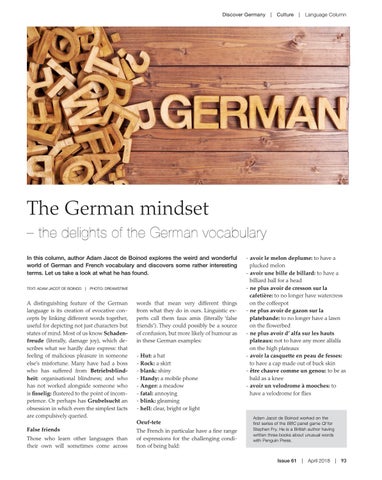Discover Germany | Culture | Language Column
The German mindset – the delights of the German vocabulary In this column, author Adam Jacot de Boinod explores the weird and wonderful world of German and French vocabulary and discovers some rather interesting terms. Let us take a look at what he has found. TEXT: ADAM JACOT DE BOINOD | PHOTO: DREAMSTIME
A distinguishing feature of the German language is its creation of evocative concepts by linking different words together, useful for depicting not just characters but states of mind. Most of us know Schadenfreude (literally, damage joy), which describes what we hardly dare express: that feeling of malicious pleasure in someone else’s misfortune. Many have had a boss who has suffered from Betriebsblindheit: organisational blindness; and who has not worked alongside someone who is fisselig: flustered to the point of incompetence. Or perhaps has Grubelsucht an obsession in which even the simplest facts are compulsively queried.
words that mean very different things from what they do in ours. Linguistic experts call them faux amis (literally ‘false friends’). They could possibly be a source of confusion, but more likely of humour as in these German examples:
False friends
The French in particular have a fine range of expressions for the challenging condition of being bald:
Those who learn other languages than their own will sometimes come across
- Hut: a hat - Rock: a skirt - blank: shiny - Handy: a mobile phone - Anger: a meadow - fatal: annoying - blink: gleaming - hell: clear, bright or light Oeuf-tete
- avoir le melon deplume: to have a plucked melon - avoir une bille de billard: to have a billiard ball for a head - ne plus avoir de cresson sur la cafetière: to no longer have watercress on the coffeepot - ne plus avoir de gazon sur la platebande: to no longer have a lawn on the flowerbed - ne plus avoir d’ alfa sur les hauts plateaux: not to have any more alfalfa on the high plateaux - avoir la casquette en peau de fesses: to have a cap made out of buck skin - être chauve comme un genou: to be as bald as a knee - avoir un velodrome à mooches: to have a velodrome for flies
Adam Jacot de Boinod worked on the first series of the BBC panel game QI for Stephen Fry. He is a British author having written three books about unusual words with Penguin Press.
Issue 61 | April 2018 | 93
